
September 17
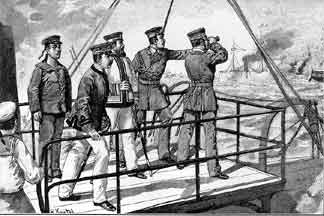
1894: First Sino-Japanese War: The Imperial Japanese Navy destroys 8 out of 10 warships of the Chinese Beiyang Fleet off the mouth of the Yalu River. (Sondhaus)
[See: Countdown to Infamy: Pearl Harbor.]
1900: Eleven-year-old Adolf Hitler continues his schooling, now at the Linz Realschule, "a gloomy four-story building on a narrow street. Utilitarian and forboding, it looked more like an office building than a school." However, for the first time, he fails to do well.18
Adolf's attitude becomes sullen and he begins to receive less than exemplary marks in school, including an "erratic" in diligence with failing marks in natural history and math. He will have to repeat this first class altogether the following year.
The move from Gymnasium—which taught a more classical education, with such subjects as Latin—to the Realschule, with its more technical curriculum, is often thought curious because it was not a traditional path to the civil service, which is the path old Alois desired Adolf to take. However, Alois himself did not take the traditional path either, making the choice perhaps somewhat less curious.
Adolf’s fellow classmate, Josef Keplinger: "He (Hitler) had 'guts.' He wasn't a hothead but really more amenable than a good many. He exhibited two extremes of character which are not often seen in unison, he was a quiet fanatic."
One of Adolf's teachers at Linz Realschule, a Professor Theodor Gissinger, would say: "I remember that he used to hold conversations with the wind-blown trees."
The recent death of his brother Edmund, to whom he was attached, may be a factor in the boy's academic decline. Even more pertinent, perhaps, is the fact that the Realschule is a new experience for Adolf, much larger than any school he had ever attended, and therefore with much more competition. Dimensions reverse unfavorably for him, as he is no longer a big fish in a small pond. Then there is the growing struggle with old Alois. The concentration of parental energies on Adolf's education is having (typically) the opposite effect from that intended: The boy rebels.19
But now, to be sure, there was a new conflict to be fought out. As long as my father's intention of making me a civil servant encountered only my theoretical distaste for the profession, the conflict was bearable. Thus far, I had to some extent been able to keep my private opinions to myself; I did not always have to contradict him immediately. My own firm determination never to become a civil servant sufficed to give me complete inner peace. And this decision in me was immutable.
The problem became more difficult when I developed a plan of my own in opposition to my father's. And this occurred at the early age of twelve. How it happened, I myself do not know, but one day it became clear to me that I would become a painter, an artist. There was no doubt as to my talent for drawing; it had been one of my father's reasons for sending me to the Realschule, but never in all the world would it have occurred to him to give me professional training in this direction. On the contrary. When for the first time, after once again rejecting my father's favorite notion, I was asked what I myself wanted to be, and I rather abruptly blurted out the decision I had meanwhile made, my father for the moment was struck speechless. "Painter ... Artist?"
He doubted my sanity, or perhaps he thought he had misheard or misunderstood me. But when he was clear on the subject, and particularly after he felt the seriousness of my intention, he opposed it with all the determination of his nature. His decision was extremely simple, for any consideration of what abilities I might really have was simply out of the question. "Artist, no, never as long as I live!" But since his son, among various other qualities, had apparently inherited his father's stubbornness, the same answer came back at him. Except, of course, that it was in the opposite sense. And thus the situation remained on both sides. My father did not depart from his "Never!" And I intensified my "Oh, yes!" The consequences, indeed, were none too pleasant.
The old man grew embittered, and, much as I loved him, so did I. My father forbade me to nourish the slightest hope of ever being allowed to study art. I went one step further and declared that if that was the case I would stop studying altogether. As a result of such "pronouncements" of course, I drew the short end; the old man began the relentless enforcement of his authority. In the future, therefore, I was silent, but transformed my threat into reality. I thought that once my father saw how little progress I was making at the Realschule, he would let me devote myself to my dream, whether he liked it or not. I do not know whether this calculation was correct. For the moment only one thing was certain: my obvious lack of success at school.
Some Hitler biographers have gone out of their way to cast doubt upon this assertion by Hitler, propagating a contrary explanation: that the poor marks themselves initiate the struggle, with Hitler blaming his embarrassing decline in performance upon a cynical conscious calculation. Either way, relations between father and son remain less than idyllic at this point in time. According to Ian Kershaw:
Whether the young Adolf, allegedly at the age of twelve, so plainly stipulated he wanted to be an artist may be doubted. But that there was a conflict with his father arising from his unwillingness to follow a career in the civil service, and that his father found fault with his son's indolent and purposeless existence, in which drawing seemed to be his main interest, seems certain.20
[For further details, Click here.]1911 Austria: On a Sunday morning, thousands of Viennese workers take to the streets, to protest price increases for meat. The crowd marches through the city and converges on the Viennese City Hall, where the police, three divisions of cavalry, and seven battalions of infantry are waiting for them. These troops cordon off all access roads to the Hofburg, to protect the emperor, as over 100 protesters are arrested in the ensuing scuffle. Three workers die. While Hitler gives no date in the following passage from Mein Kampf, it is very likely that it is this very demonstration he is writing about:
I pondered with anxious concern on the masses of those no longer belonging to their people, and saw them swelling to the proportions of a menacing army . . . . For nearly two hours, I stood there, watching with bated breath, the gigantic human dragon slowly winding by.
[For further details, Click here.]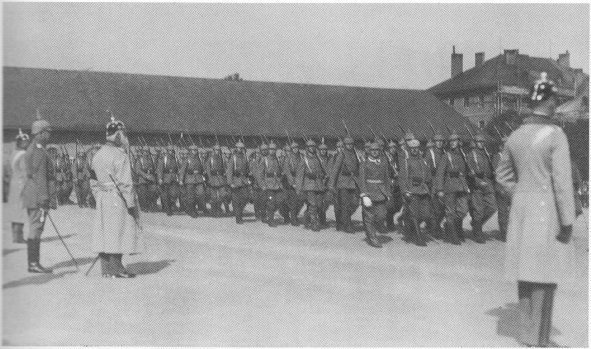
List Regiment
(Sep 1-Oct 7): Infantry Recuit Adolf Hitler's regiment begins a short but intensive basic training program, which is held in the premises of a large public school on the Elizabeth Platz in Munich. Hitler receives the first uniform of his life; basic greenish-grey with an "RIR 16" sown in red unto the epaulettes and a red stripe down the side of the trousers. The trousers are tucked into new leather boots, topped by a thick leather belt around the waist of the uniform jacket. [For further details, Click here.]
The German "Race to the Sea" begins.
The Race to the Sea was the name given to a period of World War I from the end of the German advance into France in September of 1914 to the formation of a near-continuous front line from the Swiss border to the North Sea coast of Belgium in November. The title is a misnomer as the purpose of both sides was not to be the first to the sea but instead to out-flank the enemy . . . . The route of the race was largely governed by the north-south railways available to each side, the French through Amiens and the Germans through Lille. The French Tenth Army began to assemble.
Sir John French's Second Despatch as British Commander-in-Chief: My Lord: In continuation of my dispatch of September 7th, I have the honour to report the further progress of the operations of the forces under my command from August 28th. On that evening the retirement of the force was followed closely by two of the enemy's cavalry columns, moving southeast from St. Quentin. The retreat in this part of the field was being covered by the Third and Fifth Cavalry Brigades. South of the Somme Gen. Gough, with the Third Cavalry Brigade, threw back the Uhlans of the Guard with considerable loss. Gen. Chetwode, with the Fifth Cavalry Brigade, encountered the eastern column near Cerizy, moving south. The brigade attacked and routed the column, the leading German regiment suffering very severe casualties and being almost broken up. The Seventh French Army Corps was now in course of being railed up from the south to the east of Amiens. On the 29th it nearly completed its detrainment, and the French Sixth Army got into position on my left, its right resting on Roye. The Fifth French Army was behind the line of the Oise, between La Fere and Guise. The pursuit of the enemy was very vigorous.
Sir John French's Special Order of the Day: Once more I have to express my deep appreciation of the splendid behaviour of the officers, non-commissioned officers, and men of the army under my command throughout the great battle of the Aisne, which has been in progress since the evening of the 12th inst., and the battle of the Marne, which lasted from the morning of the 6th to the evening of the 10th, and finally ended in the precipitate flight of the enemy. When we were brought face to face with a position of extraordinary strength, carefully entrenched and prepared for defence by an army and staff which are thorough adepts in such work, throughout the 13th and 14th, that position was most gallantly attacked by the British forces and the passage of the Aisne effected. This is the third day the troops have been gallantly holding the position they have gained against most desperate counter-attacks and the hail of heavy artillery. I am unable to find adequate words in which to express the admiration I feel for their magnificent conduct. The French armies on our right and left are making good progress, and I feel sure that we have only to hold on with tenacity to the ground we have won for a very short time longer when the Allies will be again in full pursuit of a beaten enemy. The self-sacrificing devotion and splendid spirit of the British army in France will carry all before it. J. D. P. FRENCH, Field Marshal, Commander in Chief of the British Army in the Field.
1916 World War I: Various: Manfred von Richthofen shoots down his first plane On this day in 1916, the German air ace Manfred von Richthofen-known to history as the "Red Baron"-shoots down his first enemy plane over the Western Front during World War I.
Richthofen, the son of a Prussian nobleman, switched from the German army to the Imperial Air Service in 1915. He became the star pupil and protégé of Oswald Boelcke, one of Germany's most successful fighter pilots. After seeing action over the Eastern Front, where he bombed Russian forces and railway junctions, Richthoften began his legendary career in the west. On September 17, 1916, in his first trip in a combat patrol commanded by Boelcke, Richthofen found himself and his Albatross biplane engaged in aerial combat by a plane piloted by British Second Lieutenant Lionel Morris. [For further details, Click here]
1917 World War I: Various:


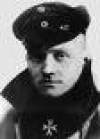
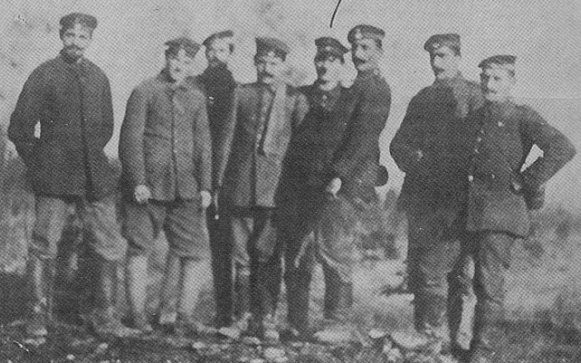
Hitler and his fellow dispatch runners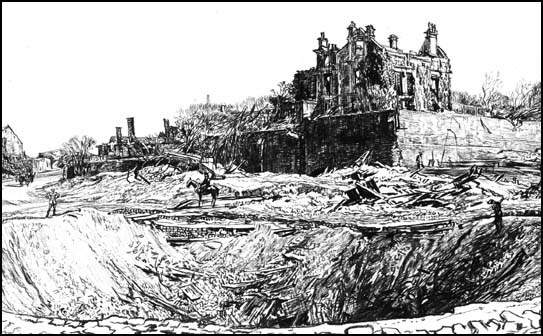
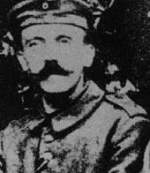
Hitler is awarded The Military Service Cross 3rd Class With Swords. [For further details, Click here.]
Austria is reinforced in Italy by seven German divisions under General Otto von Below:
One of the more capable German field commanders of the First World War, Otto von Below (1857-1944) —a cousin of Fritz von Below (reported variously as his brother), who also operated as a field commander during the war (causing some confusion among British military intelligence) —served on numerous fronts during the war.
Eastern Front: The German Army recaptures the Russian Port of Riga from Russian forces.
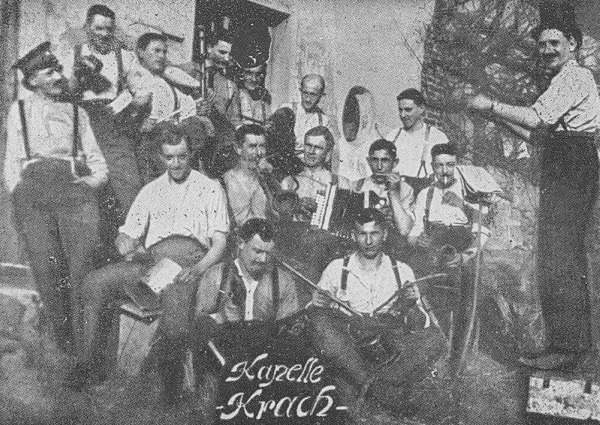
1933 Holocaust: The State Representation of German Jews is established by order of the Gestapo. (THP)
1939 World War II: Various: German Ambassador in the USSR (Schulenburg) to German Foreign Office: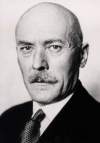
Stalin received me at 2 o'clock at night in the presence of Molotov and Voroshilov and declared that the Red Army would cross the Soviet border this morning at 6 o'clock along the whole line from Polozk to Kamenetz-Podolsk. In order to avoid incidents, Stalin urgently requested that we see to it that German planes as of today do not fly east of the Bialystok-Brest-Litovsk-Lemberg Line. Soviet planes would begin today to bomb the district east of Lemberg. I promised to do my best with regard to informing the German Air Force but asked in view of the little time left that Soviet planes not approach the above-mentioned line too closely today. The Soviet commission will arrive in Bialystok tomorrow or day after tomorrow at the latest. Stalin read me a note that is to be handed to the Polish Ambassador tonight, to be sent in copy to all the missions in the course of the day and then published. The note contains a justification for the Soviet action. The draft read to me contained three points unacceptable to us. In answer to my objections, Stalin with the utmost readiness so altered the text that the note now seems satisfactory for us. Stalin stated that the issuance of a German-Soviet communiqué could not be considered before two or three days. In future all military matters that come up are to be handled by Lieutenant General Küstring directly with Voroshilov.
On the occasion of my visit of today, Stalin informed me that the Turkish Government had proposed to the Soviet Government the conclusion of an assistance pact that was to apply to the Straits and the Balkans. The Turkish Government desires a pact with a restrictive clause whereby Turkey in rendering aid to the Soviet Union would be obligated only to such actions as are not directed against England and France. The Soviet Government is not greatly edified by the Turkish proposal and is considering proposing a clause to the Turkish Government to the effect that the Soviet Union on its part would not be obligated to any action directed against Germany. Stalin requested our reaction to this idea, but made it clearly evident that he considered the conclusion of the assistance pact in suitable form as very advantageous, since Turkey would in that case surely remain neutral. Voroshilov, who was present, added that such a pact would be a "hook" by which Turkey could be pulled away from France. Request instructions.
Soviet Union invades Poland:
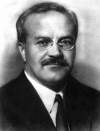
On this day in 1939, Soviet Foreign Minister Vyacheslav Molotov declares that the Polish government has ceased to exist, as the U.S.S.R. exercises the "fine print" of the Hitler-Stalin Non-aggression pact: the invasion and occupation of eastern Poland.
Hitler's troops were already wreaking havoc in Poland, having invaded on the first of the month. The Polish army began retreating and regrouping east, near Lvov, in eastern Galicia, attempting to escape relentless German land and air offensives. But Polish troops had jumped from the frying pan into the fire—as Soviet troops began occupying eastern Poland. The Ribbentrop-Molotov Non-aggression Pact, signed in August, had eliminated any hope Poland had of a Russian ally in a war against Germany. Little did Poles know that a secret clause of that pact, the details of which would not become public until 1990, gave the U.S.S.R. the right to mark off for itself a chunk of Poland's eastern region. The "reason" given was that Russia had to come to the aid of its "blood brothers," the Ukrainians and Byelorussians, who were trapped in territory that had been illegally annexed by Poland. Now Poland was squeezed from West and East—trapped between two behemoths. Its forces overwhelmed by the mechanized modern German army, Poland had nothing left with which to fight the Soviets.
As Soviet troops broke into Poland, they unexpectedly met up with German troops who had fought their way that far east in a little more than two weeks. The Germans receded when confronted by the Soviets, handing over their Polish prisoners of war. Thousands of Polish troops were taken into captivity; some Poles simply surrendered to the Soviets to avoid being captured by the Germans.
The Soviet Union would wind up with about three-fifths of Poland and 13 million of its people as a result of the invasion. (History.com)
Holocaust: Sep 17-25 Thousands of Poles are slaughtered in eastern Poland by elements of Ukrainians, Byelorussians and Jews, encouraged by Soviet slogans such as: 'For Poles, Pans and dogs—a dog's death!' In Karczowka, 24 Polish settlers are tied with barbed wire and are shot or drowned. In Luboml County, 500 Poles are murdered in a 3-day orgy by Ukrainians. A wounded priest in Brzezany County is placed near a road and is used by passing Soviet soldiers as target practice; a dozen bullets hit him before he dies at the end of the day. (THP)
1940 World War II: General Paulus, Deputy Chief of the Army General Staff, presents a plan for a massive attack on the Soviet Union. Paulus:
1941 World War II: Various:
From the Diary of Rear Admiral Giichi Nakahara:
Sinkings of the US ships have made the US declare it will attack any ship of any country of the Axis that should be found in the US patrol zones, whether it be a sub or an airplane: hereby the United States and Germany have entered into war substantially. The German front line surrounding Leningrad has pressed nearer and nearer to the city. German strength has just crossed the Dnieper and near-Crimea. (Dillon)
[See: Countdown to Infamy: Pearl Harbor.]Church and Reich: Cardinal Bertram instructs the German bishops on methods of handling the "problem" of the "non-Aryan" Catholics. He suggests using St. Paul's admonishment to the Romans and Galatians: "among those believing in Christ there is neither Jew nor Greek, for all are one in Jesus Christ." (Roman 10:12, Galatians 3:28) (THP)
Britain: The government orders potatoes to be sold at a very reduced price to encourage consumers to add the cheap staple to their diets.

Churchill meets with Stalin in Moscow as the German Army rams into Stalingrad.
From a telegram and reply from the commander of the U-boat Schacht to Doenitz's headquarters: (Schacht had been taking part in the rescue of survivors from the Laconia):
163 Italians handed over to Annamite. Navigating officer of Laconia and another English officer on board . . . Action as in wireless telegram message of 17th of September was wrong. Boat was detailed to rescue Italian allies and not for the rescue of English and Poles.
1942 World War II From the naval war diary signed by Doenitz:
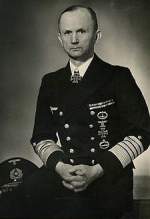
The attention of all commanding officers is again drawn again to the fact that all efforts to rescue members of the crews of ships which have been sunk contradict the most primitive demands for the conduct of warfare for annihilating enemy ships and their crews. Orders concerning the bringing in of the captains and chief engineers still stand.
From a top-secret order sent to all commanding officers of U-boats:
1. No attempt of any kind must be made at rescuing members of ships sunk; and this includes picking up persons in the water and putting them in lifeboats, righting capsized lifeboats and handing over food and water. Rescue runs counter to the rudimentary demands of warfare for the destruction of enemy ships and crews.
2. Orders for bringing in captains and chief engineers still apply.
3. Rescue the shipwrecked only if their statements will be of importance to your boat.
4. Be harsh, having in mind that the enemy takes no regard of women and children in his bombing attacks on German cities."
1943 World War II: Various:
Eastern Front
Italy: British 8th Army joins forces with US troops in the Salerno bridgehead.
When the British 8th Army crossed the Straits of Messina on 3 September, the Korps (LXXVI Panzerkorps) started a slow, but steady retreat north. When the Allies landed at Salerno, the Korps left some small units behind and rushed to the bridgehead. It counterattacked, but failed to eliminate the bridgehead. It then retreated to the Volturno, forming the German left flank.
1944 World War II: Netherlands: British airborne troops parachute into Holland to capture the Arnhem bridge as part of Operation Market Garden. The plan calls for the airborne troops to be relieved by British troops, but they are left stranded and are eventually forced to surrender to the Germans.
'Monty' planned for an airborne assault to capture five bridges in Holland to secure the roads that the Allies needed to convey their armoured divisions and supply vehicles. Two of these bridges were over canals (the Wilhelma and Zuid Willems Vaart canals) while the other three bridges were over rivers. These rivers were the Maas where the bridge crossed at Grave; the Waal where the bridge crossed at Nijmegen and the Neder Rijn at Arnhem. Here, at Arnhem, the capture of the bridge was vital as the Neder Rijn was over 100 metres wide at this point. The plan had its critics most notably in the American camp. 
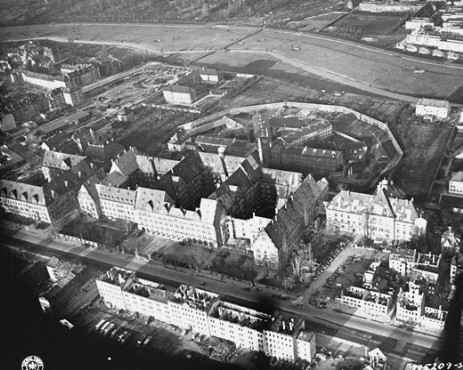
1946 Nuremberg Tribunal
: The justices continue meeting to discuss verdicts in the Major War Criminals Trial. (See: 30 September 1946) 1956 Spandau Prison: Grand Admiral Erich Raeder is released from Spandau due to ill health: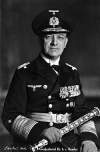
From Spandau: The Secret Diaries, by Albert Speer:
Later the British doctor returned to the cellblock and went in to see Raeder. "Didn't you say something about dizzy spells? Come along to the medical office for an examination." Both men vanished from the cellblock. The iron door closed behind them with a metallic clang. After an hour, while lunch was being passed out, and Raeder was not yet back, we looked at Pease. Nobody said a word; none of us dared to ask. But as though he guessed what we wanted to know, Pease said simply, "Yes."
Later in the afternoon Vlaer tells us that Cuthill received the astonished Raeder with the words: "You are completely free and you may go wherever you want." But Raeder wanted to return to our cellblock. He said he must hand over the library to his successor, and he didn't even know who that would be. But this request was refused. He sent his regards to us by way of the medical aide. I felt sorry for Doenitz. Raeder's release has taken a good deal out of him. For the first time in many months I have walked with him and tried to buck him up. Schirach joined us. Once free, so he confined to Schirach, Raeder plans to attack two persons chiefly: Hess, because it was psychological torture to be forced to live with him for years, and the British director, because of his total lack of feeling. "Oh hell," Doenitz said, "that may be what he had in mind. But his wife always gave the orders. Of course, he has to attack me."
1957 Louis Armstrong cancels trip to Russia:
Louis Armstrong, the famous African-American jazz musician, angrily announces that he will not participate in a U.S. government-sponsored tour of the Soviet Union. Armstrong was furious over developments in Little Rock, Arkansas, where mobs of white citizens and armed National Guardsmen had recently blocked the entrance of nine African-American students into the all-white Central High School. [For further details, Click here]
1965 Amphibious cars arrive in Frankfurt after sailing across the English Channel:
On September 17, 1965, four adventurous Englishmen arrive at the Frankfurt Motor Show in Germany after crossing the English Channel by Amphicar, the world's only mass-produced amphibious passenger car. Despite choppy waters, stiff winds, and one flooded engine, the two vehicles made it across the water in about seven hours.
The Amphicar's design, by the German engineer Hans Trippel, derived from the Schwimmwagen, the amphibious all-wheel-drive vehicle that Volkswagen had produced for the German armed forces during World War II. A company called the Quandt Group produced the Amphicars for seven years, from 1961 to1968; in all, they built about 3,900 of the little swimming convertibles. [For further details, Click here.]
1978 Camp David Accords signed:
At the White House in Washington, D.C., Egyptian President Anwar el-Sadat and Israeli Prime Minister Menachem Begin sign the Camp David Accords, laying the groundwork for a permanent peace agreement between Egypt and Israel after three decades of hostilities. The accords were negotiated during 12 days of intensive talks at President Jimmy Carter's Camp David retreat in the Catoctin Mountains of Maryland. The final peace agreement—the first between Israel and one of its Arab neighbors—was signed in March 1979. Sadat and Begin were jointly awarded the 1978 Nobel Peace Prize for their efforts. [For further details, Click here.]
Edited by Levi Bookin (Copy editor) Click to join 3rdReichStudies
Disclaimer: This site includes diverse and controversial materials—such as excerpts from the writings of racists and anti-Semites—so that its readers can learn the nature and extent of hate and anti-Semitic discourse. It is our sincere belief that only the informed citizen can prevail over the ignorance of Racialist "thought." Far from approving these writings, this site condemns racism in all of its forms and manifestations.
levi.bookin@gmail.com










Fair Use Notice: This site may contain copyrighted material the use of which has not always been specifically authorized by the copyright owner. We are making such material available in our efforts to advance understanding of historical, political, human rights, economic, democracy, scientific, environmental, and social justice issues, etc. We believe this constitutes a "fair use" of any such copyrighted material as provided for in section 107 of the US Copyright Law. In accordance with Title 17 U.S.C. Section 107, the material on this site is distributed without profit to those who have expressed a prior interest in receiving the included information for research and educational purposes. If you wish to use copyrighted material from this site for purposes of your own that go beyond 'fair use', you must obtain permission from the copyright owner.
Please Note: The list-owner and moderators of 3rdReichStudies are not responsible for, and do not necessarily approve of, the random ads placed on our pages by our web server. They are, unfortunately, the price one pays for a 'free' website.



